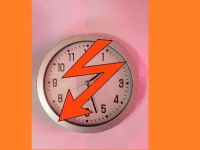Lifestyle
LOTS OF PEOPLE SET THE ALARM WITH THE BEST OF INTENSIONS BUT...
HUMANS GO THROUGH 4 TO 6 SLEEP CYCLES.

(Source: © Ruby BIRD & Yasmina BEDDOU)
Lots of people set the alarm with the best of intentions, knowing that's the time they need to get up. But the alarm clock seems to ring far before they're ready to rise, so they're hitting snooze and running late. For many of us, getting up before we could naturally is painful, being too early, too sudden, or too dark. Is there a path to kinder awakening ?
What time should you go to bed to get a good night's rest ? Sleep cycles take, on average, about 90 minutes. That means you need about 8 hours of sleep each night. You count backwards from when you have to wake up, you can figure out what time you need to go to sleep in order to wake up more easily. The thing is that some people require less or more time. To complicate matters, sleep cycles range from 90 minutes to 2 hours. We have to listen our body's rythms to figure it out.
Humans go through 4 to 6 sleep cycles every nigh. Each cycle consists of 5 stages, ranging from very light sleep (stage 1) to very deep sleep (stage 4) and the rapid eye movement stage, during which you are most likely to dream. Waking up out of a deep sleep (stage 3 or 4) is notoriously difficult. That's why being awakened from a nap can be so disorienting. It is also why waking too early in the morning can mean a miserable start.
You can manage noise, some people sleep in total silence, others need ambient noise to fall asleep. If you are not comfortable, try to get cosy (position and clothing). If you are really struggling, make a sleep mask. It can also help if you wet a washcloth with cold water, get rid of the excess water, fold it and put it over your eyes. To relax, some techniques are useful, such as loosen your muscles, stretch, meditate, count backwards... Focus your mind on only one thing, instead of racing through the day's activities.
Deep breathing can help you relax enough to fall asleep. Lie on your back in bed, watching or feeling your stomach rise, and then breathe. If things are so bad that you are tossing, turning, it might be best to get out of bed and do something for a while. For example : do something dull, watch a movie, simply rest in a comfortable chair... Sometimes sleeping with a pillow between your legs can help reduce stress or pain. Finally, pay attention to what you are eating and drinking. Some foods are known to aid sleep, while others can interfere.
Sleep Alarm Head Pillow Body Clock Bed Wake Up Cycle Human Late Tired Early Stretch Meditation Stress Pain Activity Struggle Morning Night Hygiene Diet
Liability for this article lies with the author, who also holds the copyright. Editorial content from USPA may be quoted on other websites as long as the quote comprises no more than 5% of the entire text, is marked as such and the source is named (via hyperlink).






